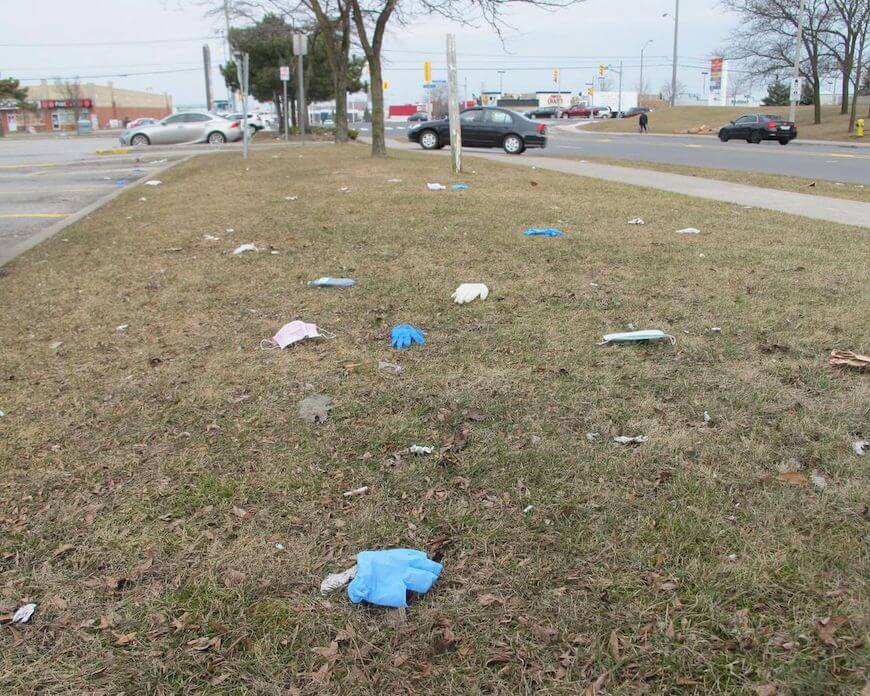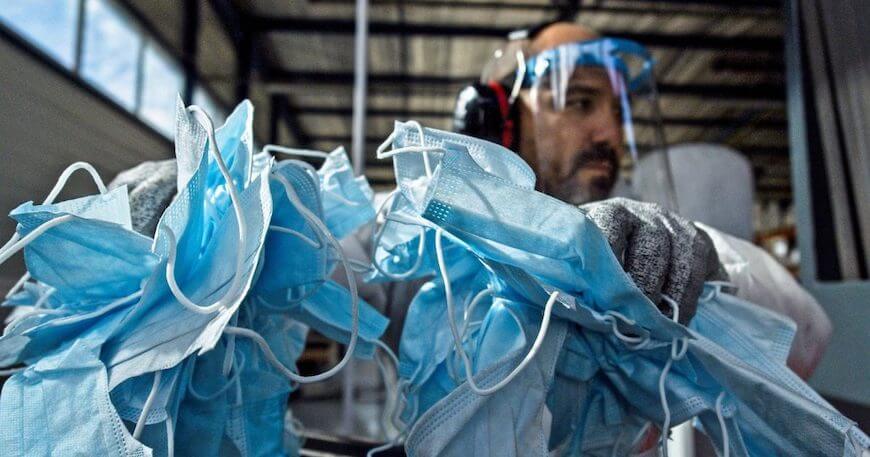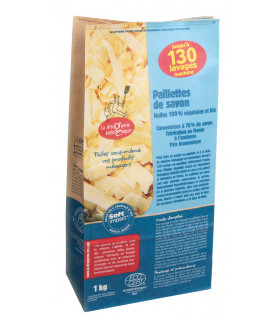The ecological impact and pollution associated with disposable masks and gloves
The 2020 health situation linked to the Covid-19 virus has prompted many prefects to make the wearing of masks compulsory. Paris, Marseille, Lyon or even Bordeaux have made it compulsory to wear a mask by law. These obligations have caused the use of single-use masks to explode. Although communication around the need for reusable fabric masks had been orchestrated, the number of people wearing disposable masks is still in the overwhelming majority today.
Don't mask the environment
With a maximum lifespan of 4 hours, plastic fabric surgical masks are thrown away very quickly and everywhere! In fact, the inevitable has become reality and the Tara foundation has alerted to this phenomenon, following the fact that gloves and masks were found in seven major European rivers
The Tiber (in Italy), the Thames (in England), the Ebro (Spain)) the Rhine, the Rhône, the Garonne, the Seine and the Loire are suffering the ecological impact of the lack of management and common sense of this waste. Plastic gloves have a degradation time of over 400 years and end up in the vast continents of plastic in the middle of the oceans. The shores, rivers and underwater life are severely by this disgraceful pollution. Polypropylene masks that are difficult to recycle, will quickly disintegrate to form microplastics, then will become nanoplastics to UV exposure. These will nest in the plankton and the water and will be swallowed by fish and underwater life, to end up on our plates.
Land, rivers, streams and oceans, there is no place in the world that escapes the mountains of plastic waste generated by the pandemic. This pollution, with unprecedented ecological impact, is amplifying and will continue unless we severely change our behavior. We are already drawing far too much from marine nature reserves and it is already difficult for the marine environment to renew itself. It is therefore impossible to add more plastic waste to the deteriorating ecological impact if we want to preserve the biodiversity of flora and fauna on Earth.

The ecological impact taken seriously by the public authorities
We can no longer count the masks thrown without scruple in the streets, the forest, by the lake or even by the sea. Although it is not uncommon to drop your mask without realizing it, it is nevertheless notable that acts of incivility are numerous. Garbage collectors quickly reported finding single-use masks along the sidewalks. In an attempt to put an end to this practice, the government has increased the fine to € 135. However, nothing helps, masks continue to litter the ground in cities and in nature. These polypropylene surgical masks will take more than 400 years to degrade and will inevitably pollute the environment, not to mention the health risk they represent.
The urgency of the ecological impact is real, and it is also accompanied by a real health problem. These masks are stuck to our lips and nostrils. They collect droplets and saliva that may contain the virus. By spreading them, we help to spread the virus everywhere. Although a large-scale awareness campaign has been launched, the latter found an echo to stem the incivilities linked to the throwing of masks inappropriately. To get rid of your disposable mask in a clean way, you have to do it in three steps:
- Place your mask in a bag dedicated to masks
- Leave the mask in the bag for 24 hours
- Dispose of the mask in a garbage bag with the household garbage
However, it is almost unrealistic to think that people do this and will tend to throw it away with household garbage at best.
Create a recycling channel for contaminated surgical masks and reduce the ecological impact
The ecological impact of the throw of the masks is undeniable and it is unfortunately impossible today to recycle them. The reason is simple: they carry a real risk of contamination. Surgical masks, made of polypropylene (PP), in fact require specific treatment. PP is used on a daily basis in certain bags, packaging or even for certain flexible food trays. It is only recyclable in certain specific industries equipped for, after a preliminary treatment and only if the plastic is thick and monochrome.
There is now a dedicated collection for the medical community. The masks used in hospitals or doctors are part of the category of hazardous waste (waste from healthcare activities with infectious risks), says DASRI - the national eco body approved by the French state. This waste is required to be managed by DASTRI, which is responsible for directing it to incinerators. Unfortunately, there is no such thing for masks used by the general public.
To reduce the ecological impact and recover the contaminated protections, it would be necessary to create a sector dedicated to their recovery. This would make it possible to treat them individually, so that they can then be put back into the more traditional recycling circuit. Since these polypropylene fabric masks are lightweight, one could estimate the volume to be negligible. It is quite another thing, because the obligation to have to mask oneself, coupled with the prolongation of the current health situation, increases the volume in a colossal way. This could significantly reduce the ecological impact and the reuse of materials could be used by many industries to avoid producing new ones.

How is Polypropylene (PP) plastic recycled?
Polypropylene plastic is one of the most widespread and used plastics on Earth and naturally makes it one of those with the greatest ecological impact. The volumes to be recycled are therefore very large. Currently PP is collected in the same way as PET or HDPE.
- With manufacturers and professionals (e.g .: hospitals)
- For individuals through the contents of yellow bins
- In waste reception centers
They go to the sorting center in order to distinguish the plastics according to their type. Each insulated plastic has its own process. The PP is crushed, then washed and finally dried. The pieces obtained can again be transformed into a based product of PP, such as food packaging or for the automotive industry. The quality may be judged to be disappointing, then the PP will be incinerated.
A dedicated sector for protective masks
Regarding surgical masks, it is vital to include additional procedures related to the virus and to hygiene. As with sorting, households should be equipped with bins for collection. These containers would be sent to specific decontamination centers, so that used single-use masks could be re-routed within existing circuits. No country is equipped in this way, and this could make it possible to create an almost non-relocatable sector of hospital waste management.
Use reusable fabric masks
Setting up a network capable of processing masks to recover the elements to be recycled will surely be expensive and will take time. This time, we are sorely lacking to date, because the current health situation makes it difficult to create a long-term vision and to give birth to projects.
To reduce our ecological impact linked to single-use masks, the solution is simple: reusable, washable and durable masks . There is a plethora of tutorials out there today on how to sew your own masks to be effective. Despite this wave of explanatory videos and government announcements to favor reusable masks made in France, fabric masks are still in the minority in the streets.
We would like to remind you that a mask that does not hold the FFP2 certification cannot filter the air and prevent infection. A home-sewn fabric mask, like surgical masks, is just to prevent saliva and droplets from being thrown out, to lower your neighbor's risk of infection.
The fabric mask can be washed about 20 times. After so many washes, the fibers are no longer able to be effective and must be separated. The difference being that the mask materials are more easily recoverable and recyclable than those from petrochemicals. Cotton being natural, it is reusable and biodegradable. The ecological and environmental impact is therefore significantly reduced.
Return of the marine world to the sender
Plastic acts as a merciless predator on marine life and its fragile ecosystems already under pressure. Without going back to the plastic continents in the oceans, floating on the surface, we must take into account a much more serious phenomenon, degradation. Plastic degrades and breaks down into microplastics, then nanoplastics in water. Fish ingest it, and nanoplastics congeal on plankton before being eaten as well. Plastic, which we have not been able to process, ends up in the food chain to directly impact us.
Our inability to manage our plastic waste is already having a negative ecological impact. We cannot be irresponsible about the fate of masks after their use. It is therefore of the utmost importance to properly dispose of your mask and avoid its ecological impact on the ocean. The health crisis can, in the short or medium term, turn into a social crisis for fishermen if the fish become unfit for consumption.
We must be responsible for the waste generated. Preserving flora and fauna is central to the survival of mankind. The perpetual negligence linked to our inability to realize our ecological impact means that we are increasingly destroying land and marine resources. Throwing a mask in the middle of nature or in the street, so that they end up eaten by the animals is total nonsense. The best is still to only use reusable cotton fabric masks.
The scientific community seeks to make surgical masks reusable
To expect common sense to properly dispose of a mask, or that everyone only uses a sheet mask, seems unrealistic. This view seems mixed, as some scientists are researching how to make PP masks reusable. Several tests are underway to test how to modify the masks. There are also plans to make the polypropylene layers slightly thicker so that they can be washable and reusable. One test even showed that surgical masks machine washed at 95°C did not lose performance.
Olivier Terrier, researcher at the CNRS, to demonstrate that a dry heat of 70 degrees destroys the virus on surgical masks and those stamped FFP2. The alternatives are therefore starting to emerge. However, the advanced are making little headway. So until any real, easily applicable breakthroughs emerge, try to use only homemade fabric masks and resort to their plastic versions only in real emergencies.






